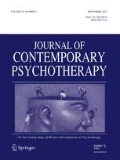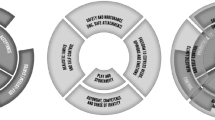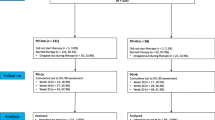Abstract
Previous research had associated early maladaptive schemas, cognitive fusion and psychological needs. However, a deeper understanding of these relationships is needed regarding mediational effects of schemas on psychological needs and symptomatology. We aimed to explore the relationships between schema domains, cognitive fusion, psychological needs and symptoms. Therefore a clinical sample composed of 58 individuals with psychiatric diagnosis, who filled self-reported questionnaires was reanalyzed on a cross-sectional design. Medium to strong correlations between schema domains and dialectical polarities of psychological needs were found. Cognitive fusion mediated the relationship between schema domains with symptomatology. Also, the relationship between psychological needs and disconnection and rejection and overvigilance and inhibition domains was mediated by cognitive fusion. Schema domains are strongly related with the regulation of psychological needs and symptomatology. These results may be important not only to transtheoretical and integrative case conceptualization but also to clinical decision-making tailored to the patient’s characteristics, styles of communication and needs.


Similar content being viewed by others
References
Bach, B., Lockwood, G., & Young, J. E. (2017). A new look at the schema therapy model: Organization and role of early maladaptive schemas. Cognitive Behaviour Therapy. https://doi.org/10.1080/16506073.2017.1410566.
Barreira, J., & Vasco, A. B. (2016). Relações entre dificuldades de processamento emocional, regulação emocional, necessidades psicológicas, sintomatologia e bem-estar/distress (Relationship between emotional processing difficulties, emotional regulation, psychological needs, symptomatology and well-being/distress). Master thesis in Faculty of Psychology of University of Lisbon, Lisbon.
Beck, A. T., & Bredemeier, K. (2016). A unified model of depression. Clinical Psychological Science, 4(4), 596–619. https://doi.org/10.1177/2167702616628523.
Beck, A. T., Davis, D. D., & Freeman, E. (1990). Cognitive therapy of personality disorders. London: The Guilford Press.
Blatt, S. J. (2008). Polarities of experience – relatedness and self-definition in personality development, psychopathology, and the therapeutic process. Washington: American Psychological Association.
Canavarro, M. C. (1999). Inventário de sintomas psicopatológicos—BSI (Inventory of psychopathological problems). In M. R. Simões, M. Gonçalves, & L. S. Almeida (Eds.), Testes e provas psicológicas em Portugal (Vol. II, pp. 95–109). Braga: APPORT/SHO.
Castelo-Branco, M., & Vasco, A. B. (2016) (em preparação). Relações entre regulação emocional, regulação da satisfação das necessidades psicológicas, bem-estar/distress psicológicos e sintomatologia (Relationships between emotional regulation, regulation of the satisfaction of psychological needs, psychological well-being/distress and symptomatology). Master thesis in Faculty of Psychology of University of Lisbon, Lisbon.
Conceição, N., & Vasco, A. B. (2005). Olhar para as necessidades do self como o boi olha para um palácio: Perplexidades e fascínio (Look at the needs of the self as the ox looks at a palace: Perplexities and fascination). Psychologica,40, 11–36.
Conde, E., Vasco, A. B., Ferreira, A., Romão, A. R., Silva, G., Sol, A., et al. (2012). Regulação da satisfação de necessidades psicológicas: Influência no bem-estar e distress psicológicos e na sintomatologia de acordo com o modelo de complementaridade paradigmática. Lisbon: Faculdade de Psicologia da Universidade de Lisboa.
Dadomo, H., Grecucci, A., Giardini, I., Ugolini, E., Carmelita, A., & Panzeri, M. (2016). Schema therapy for emotional dysregulation: Theoretical implication and clinical applications. Frontiers in Psychology, 7, 1987. https://doi.org/10.3389/fpsyg.2016.01987.
Davoodi, E., Wen, A., Dobson, K. S., Noorbala, A. A., Mohammadi, A., & Farahmand, Z. (2018). Early maladaptive schemas in depression and somatization disorder. Journal of Affective Disorders, 235, 82–89. https://doi.org/10.1016/j.jad.2018.04.017.
Derogatis, L. R. (1993). BSI: Brief symptom inventory (3rd ed.). Minneapolis: National Computers Systems.
Dinis, A., Carvalho, S., Gouveia, J. P., & Estanqueiro, C. (2015). Shame memories and depression symptoms: The role of cognitive fusion and experiential avoidance. International Journal of Psychology and Psychological Therapy.,15(1), 63–86. https://doi.org/10.1177/014544551139834.
Dubois, D. J., Martin, R. A., & Bieling, P. B. (2009). Early maladaptive schemas and adaptive styles of humor. Cognitive Therapy,33, 585–596.
Epstein, S. (1993). Implications of cognitive-experiential self-theory for personality and developmental psychology. In D. Funder, R. Parke, C. Tomlinson-Keasey, & K. Widamen (Eds.), Studying lives through time: Personality and development (pp. 399–438). Washington, DC: American Psychological Association.
Faria, J., & Vasco, A. B. (2011). Needs necessarily needed: A guide for clinical decision-making. Paper presented at the 27th Conference of the Society for the Exploration of Psychotherapy Integration: Crossing the divide: SEPI’s unique place in bridging the science-practice gap, Washington, DC.
Faustino, B. (in press). Transdiagnostic perspective of psychological inflexibility and emotional dysregulation.
Faustino, B., & Vasco, A. B. (2019). Schematic functioning, interpersonal dysfunctional cycles and cognitive fusion in the complementary paradigmatic perspective: Analysis of a clinical sample. Journal of Contemporary Psychotherapy. https://doi.org/10.1007/s10879-019-09422-x.
Faustino, B., Fonseca, I., Antonio, A. B., Baião, M., Lopes, P., & Oliveira, J. (2019a). Dominios esquemáticos e dificuldades emocionais na regulação das necessidades psicológicas: Um estudo com indicadores comportamentais (Schema domains and emotional difficulties on the regulation of psychological needs: A study with behavioral indicators). Revista de Psicossomática, 1.
Faustino, B., Vasco, A. B., Oliveira, J., Lopes, P., & Fonseca, I. (2019b). Metacognitive self-assessment scale: Psychometric properties and clinical applications. Applied Neuropsychology: Adult. https://doi.org/10.1080/23279095.2019.1671843.
Ferreira, C., Palmeira, L., & Trindade, I. A. (2014). Turning eating psychopathology risk factors into action. The pervasive effect of body image-related cognitive fusion. Appetite,80, 137–142. https://doi.org/10.1016/j.eatbeh.2013.10.01.
Fonseca, J. M. (2012). Relação entre a regulação da satisfação das necessidades psicológicas, funcionamento esquemático e alexitimia (Relationship between satisfaction of psychological needs, schematic functioning and alexythimia). Master thesis in the Faculty of Psychology of the University of Lisbon, Lisbon.
García-Gómez, M., Guerra, J., López-Ramos, V. M., & Mestre, J. M. (2019). Cognitive fusion mediates the relationship between dispositional mindfulness and negative affects: A study in a sample of spanish children and adolescent school students. International Journal of Environmental Research and Public Health, 16(23), 4687. https://doi.org/10.3390/ijerph16234687.
Gillanders, D. T., Bolderston, H., Bond, F. W., Dempster, M., Flaxman, P. E., Campbell, L., et al. (2014). The development and initial validation of The Cognitive Fusion Questionnaire. Behavior Therapy, 45, 83–101. https://doi.org/10.1016/j.beth.2013.09.001.
Hawke, L. D., & Provencher, M. D. (2011). Schema theory and schema therapy in mood and anxiety disorders: A review. Journal of Cognitive Psychotherapy An International Quarterly. https://doi.org/10.1891/0889-8391.25.4.257.
Hayes, A. F. (2013). Introduction to mediation, moderation, and conditional process analysis: A regression-based approach. New York: Guilford Press.
Hayes, S. C., Strosahl, K. D., & Wilson, K. G. (2011). Acceptance and commitment therapy: The process and practice of mindful change (2nd ed.). New York: Guilford Press.
Kazdin, A. E. (2007). Mediators and mechanisms of change in psychotherapy research. Annual Review of Clinical Psychology,3, 1–27.
Kazdin, A. E. (2009). Understanding how and why psychotherapy leads to change. Psychotherapy Research,19(4–5), 418–428.
Lobbestael, J., van Vreeswijk, M., & Arntz, A. (2008). An empirical test of schema mode conceptualizations in personality disorders. Behaviour Research and Therapy,46, 854–860. https://doi.org/10.1016/j.brat.2008.03.006.
Lockwood, G., & Perris, O. (2012). A new look at core emotional needs. In M. V. Vreeswijk, J. Broersen, & M. Nadort (Eds.), The Wiley-Blackwell handbook of schema therapy: Theory, research, and practice (pp. 41–66). Hoboken: Wiley. https://doi.org/10.1002/9781119962830.ch3.
Millon, T., & Davis, R. D. (1996). Disorders of personality: DSM-IV and beyond. New York: Wiley.
Noureen, A., & Malik, S. (2019). Conceptualized-self and depression symptoms among university students: Mediating role of cognitive fusion. Current Psychology. https://doi.org/10.1007/s12144-019-00450-3.
Pallant, J. (2007). SPSS survival manual: A step by step guide to data analysis using SPSS for Windows (version 15). Berkshire: Open University Press, McGrow Hill Education.
Pinto-Gouveia, J., Dinis, A., Gregório, S., & Pinto, P. (2018). Concurrent effects of different psychological processes in the prediction of depressive symptoms – the role of cognitive fusion. Current Psychology. https://doi.org/10.1007/s12144-017-9767-5.
Pinto-Gouveia, J., Rijo, D., Robalo, M., Castilho, P., Fonseca, L., Salvador, M., et al. (2005). The portuguese version of the Young’s Schema Questionnaire - randomized form (YSQ-RE2R): Validation studies (pp. 84–85). In XXXV Annual Congress of the European Association for Behaviour and Cognitive Therapies Abstract book. Thessaloniki.
Rafaeli, E., Bernstein, D. P., & Young, J. (2011). The CBT distinctive features series. Schema therapy: Distinctive features. New York: Routledge/Taylor & Francis Group.
Renner, F., Lobbestael, J., Peeters, F., Arntz, A., & Huibers, M. (2012). Early maladaptive schemas in depressed patients: Stability and relation with depressive symptoms over the course of treatment. Journal of Affective Disorders, 136(3), 581–590. https://doi.org/10.1016/j.jad.2011.10.027.
Rijo, D. (2009). Esquemas mal-adaptativos precoces: Validação do conceito e dos métodos de avaliação. Coimbra: Faculdade de Psicologia e de Ciências da Educação da Universidade de Coimbra. http://hdl.handle.net/10316/18486.
Sol, A., & Vasco, A. B. (2017). Relationships between the regulation of psychological needs satisfaction and symptomatology. Psicologia,31, 1.
Thimm, J. C. (2013). Early maladaptive schemas and interpersonal problems: A circumplex analysis of the YSQ-SF. International Journal of Psychology & Psychological Therapy,13(1), 113–124.
Thimm, J. C., & Holland, J. M. (2016). Early maladaptive schemas, meaning making, and complicated grief symptoms after bereavement. International Journal of Stress Management. https://doi.org/10.1037/str0000042.
Vasco, A. B. (2001). Fundamentos para um modelo integrativo de “complementaridade paradigmática” (Fundamentals for an integrative model of “paradigmatic complementarity”). Psicologia,XV(2), 219–226.
Vasco, A. B. (2005). A conceptualização de caso no modelo de complementaridade paradigmática: Variedade e integração (Case conceptualization in the model of paradigmatic complementarity: Variety and integration). Psychologica,40, 11–36.
Vasco, A. B., Conceição, N., Silva, A. N., Ferreira, J. F., & Vaz-Velho, C. (2018). O (Meta) Modelo de Complementariedade Paradigmática (MCP). In Isabel Leal (Ed.), Psicoterapias.
Welburn, K., Coristine, M., Dagg, P., Pontefract, A., & Jordan, S. (2002). The schema questionnaire: Short form: Factor analysis and relationship between schemas and symptoms. Cognitive Therapy and Research,26, 519–530.
Young, J. E. (1999). Cognitive therapy for personality disorders: A schema-focused approach (3rd ed.). Sarasota, FL: Professional Resources Press.
Young, J. E. (2005). The young schema inventory, standardized items (3rd version). New York: Schema Therapy Institute.
Young, J. E., Klosko, J. S., & Weishaar, M. E. (2003). Schema therapy. A practitioner’s guide. New York: The Guilford Press.
Funding
The present investigation did not have any funding.
Author information
Authors and Affiliations
Corresponding author
Ethics declarations
Conflict of interest
The authors declare that they have no conflict of interest.
Ethical Approval
All procedures performed in studies involving human participants were in accordance with the ethical standards of the institutional and/or national research committee and with the 1964 Helsinki declaration and its later amendments or comparable ethical standards.
Research Involving Human Participants and/or Animals
This research was conducted only with humans.
Informed Consent
Informed consent was obtained from all individual participants included in the study.
Additional information
Publisher's Note
Springer Nature remains neutral with regard to jurisdictional claims in published maps and institutional affiliations.
Rights and permissions
About this article
Cite this article
Faustino, B., Vasco, A.B. Early Maladaptive Schemas and Cognitive Fusion on the Regulation of Psychological Needs. J Contemp Psychother 50, 105–112 (2020). https://doi.org/10.1007/s10879-019-09446-3
Published:
Issue Date:
DOI: https://doi.org/10.1007/s10879-019-09446-3




